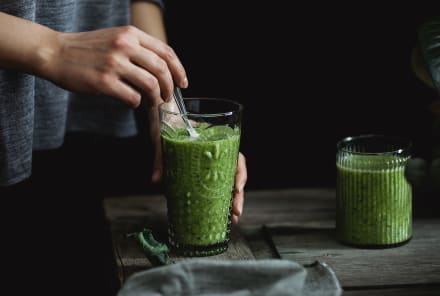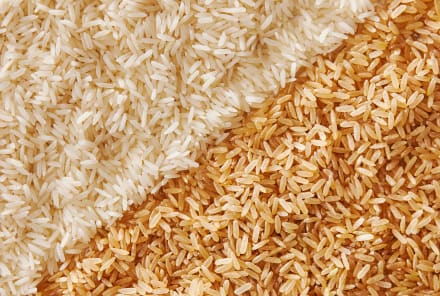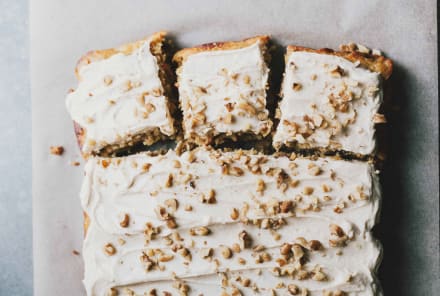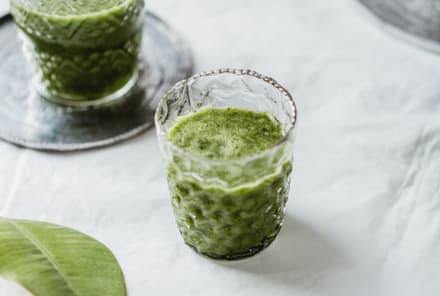Advertisement
How To Increase Metabolism & Effortlessly Maintain Your Happy Weight


The concepts of metabolism, energy balance, and weight loss and management can feel really complicated and overwhelming. So let's break it down and cover the most important concepts: First, the food you eat is either stored in your body or used as fuel. Your metabolism is the process in your body that turns food into usable energy, so if your metabolism is slow, you're going to have a harder time "burning off" those calories and they will instead be stored in your fat cells—making it a lot more difficult to lose weight.
We want to do everything we can to maintain our health on the outside, but the truth is that what you see on the outside starts on the inside. And by simply leveraging what we know about the way our biochemistry works, we can hack our way to a faster metabolism. Here, my friend, is your functional medicine guide to increasing your metabolism to promote weight loss:
1. Increase your healthy fats.
Healthy fats are the building block for sustainable blood sugar and weight management. Your body uses glucose from sugar and carbs for energy. But once that is used up, your body starts to use fat, which helps you lose weight and maintain muscle tissue. In fact, medium-chain triglycerides like the ones found in coconut oil are not stored as fat as easily in the body and are actually more readily used as energy.
2. Try intermittent fasting.
By periodically limiting your food intake for certain stretches of time, you are able to help bring down markers of inflammation throughout your body. It even has been shown to decrease insulin resistance, which is linked to metabolic syndrome causing weight gain and diabetes. It also kick-starts your body into burning those healthy fats for energy.
3. Stay hydrated.
Your body is comprised of anywhere between 55 and 60 percent water; that’s over half of your body! Every single cell uses water to regulate temperature and maintain proper function. You are constantly losing water through sweating, breathing, and digesting food. Because of this, just by upping your water by six glasses a day you can increase your metabolism and burn almost1 20,000 extra calories per year.
4. Balance your hormones.
Leptin is a hormone produced in your fat cells, with the job of telling your brain to use fat for energy. Leptin resistance occurs when your body stops recognizing this hormone and tricks your metabolism into thinking it’s starving—causing it to continually store fat instead of burning it off. A blood test can easily check your leptin levels. Your ideal range should be between 4 and 6 ng/dL.
5. Get swoll.
It’s time to pick up those weights! Muscle uses more energy than fat, so it can be beneficial to incorporate strength training into your workout routine. Studies have shown2 that building up muscle improves resting metabolic rate, which can help you burn more calories overall and improve whole-body metabolism.
6. Sip tea.
Thermogenesis is a process in which your body produces heat, which in turn can increase the number of calories that you burn. Certain foods contain naturally occurring thermogenic nutrients such as catechin-containing green tea. Just by regularly sipping on green tea throughout your day you can increase your metabolism by 4 to 5 percent and increase fat burning by 10 to 16 percent.
7. Reduce your alcohol intake.
When you drink, your body is busy metabolizing the alcohol and this decreases its ability to metabolize fats and carbohydrates as effectively—causing your metabolism to slow. Studies have shown that your body’s fat burning actually decreases by 73 percent after indulging in an alcoholic beverage.
8. Get your thyroid checked.
Your thyroid reigns supreme above all other hormones in your body and is the master of your metabolism. T4 and T3 hormones are produced by the thyroid and are released to every part of your body to increase cellular activity and metabolism. Problems arise when your thyroid is underperforming and not creating enough of these hormones because this slows your metabolism. Having a full thyroid panel done can give a good overall picture of your total thyroid health. The labs I have run are thyroid peroxidase antibodies, thyroglobulin antibodies, TSH, free T4, free T3, and reverse T3.
9. Embrace the cold.
Whenever you find yourself in a colder environment, your body can start to shiver. This is your body’s way of raising your internal temperature. But even when you are not actively shivering, your body is still working to keep warm. Your body has multiple types of fat—one being white fat, which stores extra energy and is associated with obesity, and the other being brown fat, which burns chemical energy to help create heat. Studies have shown3 that being regularly exposed to colder temperatures can increase your brown fat percentage and actually speed up your metabolism. So next time you want to rush inside to escape the cold, stay out a little longer!
10. Heal your gut.
Science is finally starting to recognize the importance of your gut microbiome and the role it plays in your overall health. Your metabolism is no exception. Without the proper balance of bacteria in your microbiome, it can lead to a slowed metabolism and increased weight. In one study4, researchers took microbiome samples from both lean and obese mice and placed them in the gut of neutral mice. It was shown that the mice with the obese microbiome sample actually extracted MORE calories from the same exact food, gained more weight, and had increased insulin resistance. Make sure you have enough good bacteria in your gut by supplementing with probiotic-rich foods like kefir, sauerkraut, and probiotics.

Will Cole, IFMCP, DNM, D.C., is a leading functional medicine expert who consults people around the globe, starting one of the first functional medicine telehealth centers in the world. Named one of the top 50 functional and integrative doctors in the nation, Dr. Will Cole provides a functional medicine approach for thyroid issues, autoimmune conditions, hormonal imbalances, digestive disorders, and brain problems. He is the host of the popular The Art Of Being Well podcast and the New York Times bestselling author of Intuitive Fasting, Ketotarian,The Inflammation Spectrum, and Gut Feelings.
More from the author:
Functional Nutrition Training
Check out Functional Nutrition Coaching
A cutting-edge nutrition deep dive taught by 20+ top health & wellness experts
Learn moreMore from the author:
Functional Nutrition Training
Check out Functional Nutrition Coaching
A cutting-edge nutrition deep dive taught by 20+ top health & wellness experts
Learn more
Will Cole, IFMCP, DNM, D.C., is a leading functional medicine expert who consults people around the globe, starting one of the first functional medicine telehealth centers in the world. Named one of the top 50 functional and integrative doctors in the nation, Dr. Will Cole provides a functional medicine approach for thyroid issues, autoimmune conditions, hormonal imbalances, digestive disorders, and brain problems. He is the host of the popular The Art Of Being Well podcast and the New York Times bestselling author of Intuitive Fasting, Ketotarian,The Inflammation Spectrum, and Gut Feelings.
Watch Next
Enjoy some of our favorite clips from classes
Enjoy some of our favorite clips from classes
What Is Meditation?
Mindfulness/Spirituality | Light Watkins
Box Breathing
Mindfulness/Spirituality | Gwen Dittmar
What Breathwork Can Address
Mindfulness/Spirituality | Gwen Dittmar
The 8 Limbs of Yoga - What is Asana?
Yoga | Caley Alyssa
Two Standing Postures to Open Up Tight Hips
Yoga | Caley Alyssa
How Plants Can Optimize Athletic Performance
Nutrition | Rich Roll
What to Eat Before a Workout
Nutrition | Rich Roll
How Ayurveda Helps Us Navigate Modern Life
Nutrition | Sahara Rose
Messages About Love & Relationships
Love & Relationships | Esther Perel
Love Languages
Love & Relationships | Esther Perel











